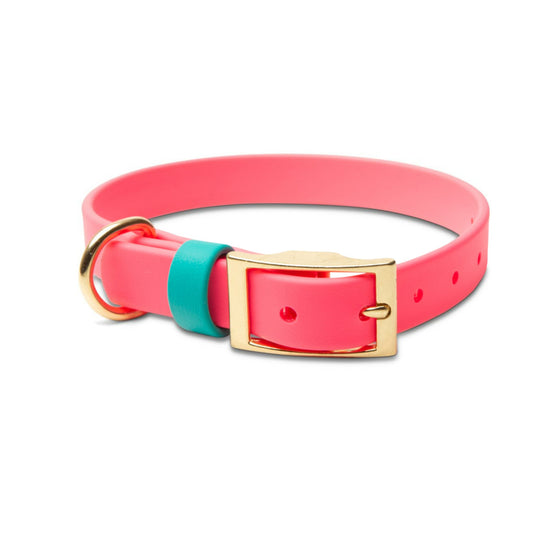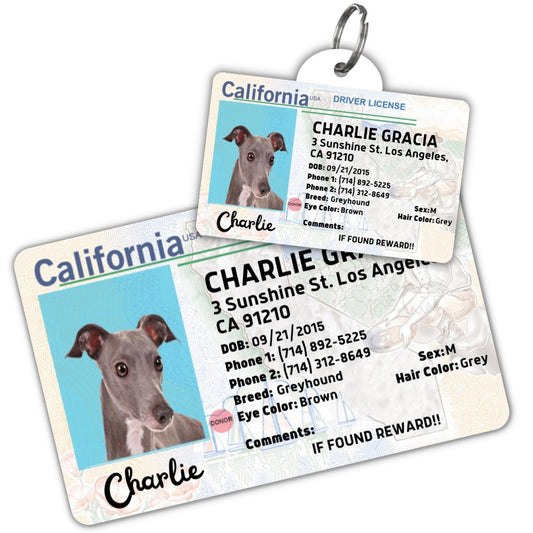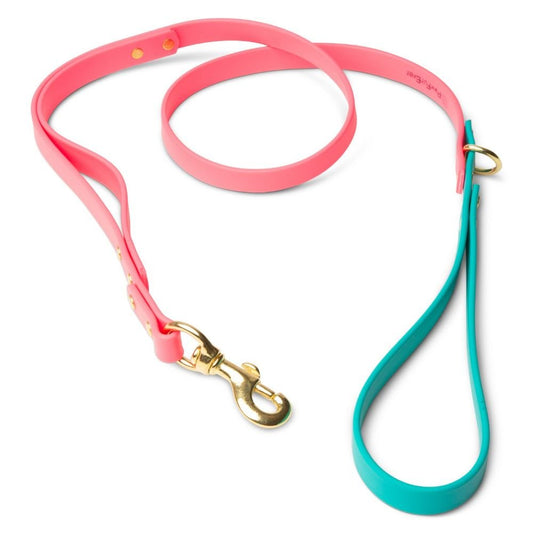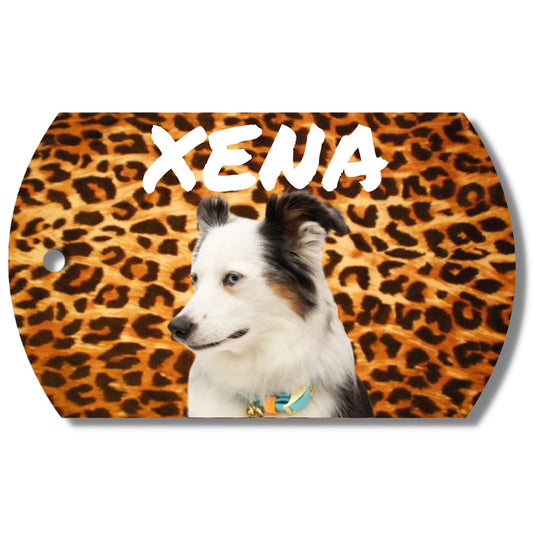
The Importance of Personalized Dog ID Tags for Safety and Peace of Mind
As pet owners, we all want to ensure the safety and well-being of our beloved furry friends. One essential tool for keeping our dogs safe is a personalized ID tag. In this article, we will explore the significance of dog ID tags, what information to include on them, and where to get the best tags for your pet. So, let's dive in and discover how a simple ID tag can make a world of difference in ensuring the quick and safe return of your furry companion.
Why are Personalized Dog ID Tags Important?
Accidents happen, and even the most well-behaved dogs can unexpectedly wander off. Whether it's a momentary lapse in attention or a moment of curiosity, dogs are prone to exploring their surroundings. In fact, according to the American Humane Association, one in three dogs will go missing at some point in their lives[^1^]. This is where a personalized ID tag can be a lifesaver.
While modern technology, such as microchips and dog-finding apps, has improved our chances of finding lost pets, an ID tag remains the fastest and most convenient way for someone to contact you if they find your dog. Unlike a microchip that requires a trip to a vet clinic or shelter to access the information, an ID tag provides immediate contact details for a quick reunion.
Not only does an ID tag increase the likelihood of a lost dog being returned, but it also makes your dog more approachable to strangers. It signals that your dog is not a stray and may prompt someone to take protective action or reach out for assistance.
What to Include on Your Dog's ID Tag
When it comes to deciding what information to include on your dog's ID tag, it's essential to strike a balance between providing enough details for identification and keeping the tag concise and readable. Here are some key pieces of information you should consider including:
-
Your Pet's Name: Including your dog's name on the tag helps create a sense of familiarity and may make them more responsive if someone calls them by name.
-
Your Phone Number: Your phone number is the most crucial piece of contact information. Ensure that you include a number that you are likely to answer promptly. Consider adding an alternate contact number, such as a friend or neighbor, to increase the chances of a successful reunion.
-
Your City: If space permits, including your city can provide a general location for where your dog belongs. This information can be particularly helpful if your dog wanders off within your neighborhood.
-
Medical Needs: If your dog has any specific medical needs, such as allergies or requiring medication, consider adding a brief note on the tag. This can alert anyone who finds your dog to take extra precautions or seek immediate medical attention if necessary.
-
Microchip Information: It's a good idea to mention on the tag that your dog is microchipped. This serves as an additional layer of identification and encourages those who find your dog to bring them to a veterinarian or shelter for scanning.
-
A Personal Message: Adding a personalized message can make your dog's tag unique and memorable. Consider phrases like "I'm friendly," "Please call my mom," or "If I'm alone, I'm lost" to add a touch of personality and increase the chances of a compassionate response.
-
A Reward: If you are willing and able to offer a reward, mentioning it on the tag can incentivize someone to make an extra effort to return your dog safely.
Remember, you may not be able to include all of these items on a single tag due to limited space. Choose the information that is most relevant to your dog's situation and customize the tag accordingly.
The Benefits and Considerations of Dog ID Tags
While dog ID tags offer numerous benefits, it's essential to be aware of potential drawbacks and take necessary precautions. Let's explore the advantages and considerations of using dog ID tags:
Benefits of Dog ID Tags
-
Inexpensive: Dog ID tags are affordable and accessible. They provide great value for the peace of mind they offer.
-
Customizable: ID tags can be personalized with various designs, colors, and messages to reflect your dog's personality. This customization adds a personal touch and makes your dog's tag stand out.
-
Easy to Read: Unlike other identification methods, such as microchips or tattoos, ID tags are easily readable by anyone. This makes it more likely that someone who finds your lost dog will notice the tag and take the necessary steps to contact you.
-
Immediate Identification: An ID tag is the fastest way for someone to identify your dog and ensure a quick reunion. It eliminates the need for specialized equipment (such as microchip scanners) and simplifies the process for both the finder and yourself.
Considerations of Dog ID Tags
-
Choking Hazard: Depending on the design and material of the tag, there is a potential risk of it becoming caught on something, posing a choking hazard. To minimize this risk, choose a well-fitted collar, ensuring that you can fit two fingers comfortably between the collar and your dog's neck.
-
Tag Noise: Some ID tags can create noise when they jingle against other tags or objects. While this may not be a concern for everyone, it can be bothersome in certain situations. To address this, consider using tag silencers, which are plastic pieces that wrap around the tag to minimize noise. Alternatively, you can explore options like laminating the tags or using tagless collars with personalized embroidery.
-
Dog's Acceptance: Some dogs may initially resist wearing tags due to the added weight or unfamiliar sensation. Introduce your dog to the tag gradually, starting with just the collar and gradually adding the tag. Use positive reinforcement, such as treats and rewards, to associate the tag with positive experiences. If your dog continues to resist wearing tags, consider alternative identification methods, such as embroidered collars.
Where to Get Your Dog's ID Tag
Getting a personalized ID tag for your dog is easy and convenient. Here are a few options for obtaining a custom tag:
-
Pet Retailers: Major pet retailers like Petco and PetSmart offer dog tag engraving services using their in-store machines. These machines allow you to select the design, font, and information to be engraved on the tag, providing a quick and hassle-free solution.
-
Online Retailers: If you prefer the convenience of online shopping, platforms like Amazon offer a wide range of customizable dog tags. You can browse through various designs, shapes, and materials and have the tag delivered right to your doorstep. Additionally, websites like Etsy offer unique and handmade tags for pet owners who want something extra special.
When choosing where to get your dog's ID tag, consider factors such as quality, durability, and readability. Opt for materials like stainless steel or durable plastic that can withstand the rigors of your dog's daily activities.
Conclusion
In summary, a personalized ID tag is an essential tool for keeping your dog safe and ensuring their quick return if they ever get lost. By including vital information such as your phone number, city, and any medical needs, you increase the chances of a successful reunion. Dog ID tags are inexpensive, customizable, and easy to read, making them an ideal choice for pet owners looking to enhance their dog's safety.
When getting an ID tag, consider the potential drawbacks, such as the risk of choking or tag noise, and take necessary precautions to address these concerns. Introduce your dog to the tag gradually and explore alternatives if your dog is resistant to wearing tags.
Whether you choose to visit a pet retailer or purchase online, there are plenty of options available for obtaining personalized ID tags. Choose a reliable source that offers durable materials and clear engraving for maximum effectiveness.
Remember, accidents happen, but with a personalized ID tag, you can provide your dog with an extra layer of protection and ensure their safe return home. Invest in a custom dog ID tag today and enjoy the peace of mind that comes with knowing your furry friend is always just a phone call away.
If you have any questions or concerns about your dog's safety or well-being, always consult with your veterinarian. They are your best resource for personalized advice and guidance.





